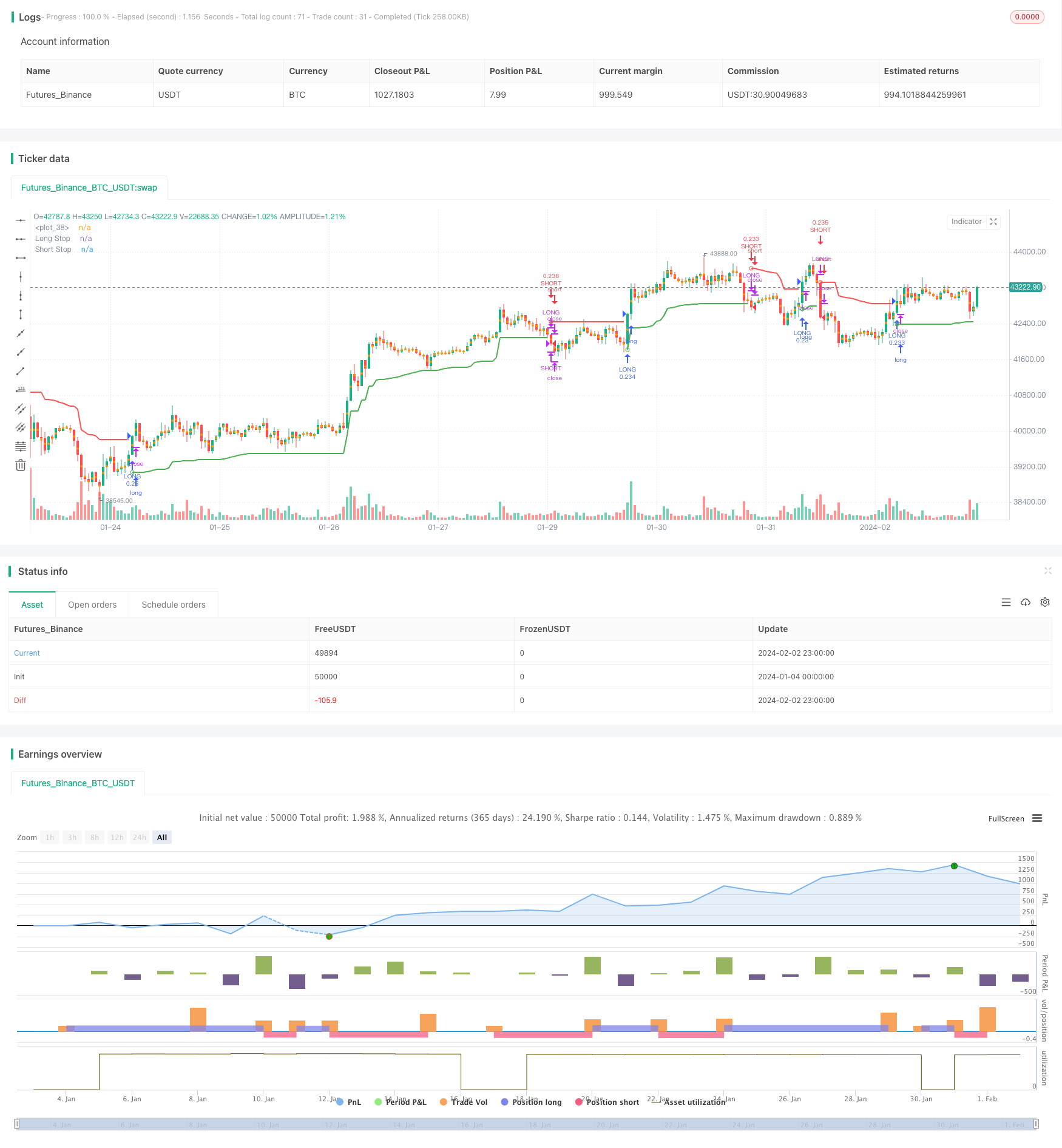
概述
这个策略的主要思想是基于ATR指标计算出长线和短线的止损位,当价格突破这些止损线时生成交易信号。它同时具有趋势跟踪和震荡捕捉的功能。
策略原理
该策略使用ATR指标的N周期ATR乘以一个系数来计算长短两边的止损线。具体计算公式如下:
长线止损 = 最高价 - ATR * 系数
短线止损 = 最低价 + ATR * 系数
当价格上涨突破长线止损线时做多,当价格下跌突破短线止损线时做空。做多做空后会实时跟踪价格的波动来移动止损线。
这种以ATR波带作为止损位设置的方法,可以在保证止损风险的前提下充分捕捉价格趋势。当价格出现较大幅度的突破时产生信号,可以有效滤除假突破。
优势分析
这种策略最大的优势在于可以自动调整止损位,捕捉价格趋势的同时控制风险。具体优势如下:
基于ATR指标设置浮动止损,可以根据市场波动性调整止损幅度,有效控制单笔损失。
采用突破方式产生信号,可以滤除部分噪音,避免追顶和追底。
实时调整止损线追踪价格波动,防止止损过于宽松,锁定更多盈利。
风险分析
该策略也存在一些风险,主要集中在止损位设置和信号产生方式上。具体风险点如下:
ATR周期和系数不当可能导致止损过宽或过窄。
突破信号方式可能漏掉趋势初期机会。
趋势末期止损追踪可能有所滞后,无法完美退出。
对策主要是调整参数使止损更合理,或者辅助其他指标判断趋势和信号。
优化方向
该策略可以从以下几个方面继续优化:
设置第二层止损,进一步控制风险。
结合其他指标判断趋势,提高信号质量。
添加移动止盈策略,在趋势进一步延续时提高获利。
优化ATR周期和系数参数,使止损更贴近实际价格波动。
总结
这个策略整体来说非常实用,可以自动调整止损位有效控制风险,同时通过趋势跟踪可以获得不错的盈利。我们可以在原有基础上进一步结合其他分析方法来优化和改进策略,使其更稳定和智能。
策略源码
/*backtest
start: 2024-01-04 00:00:00
end: 2024-02-03 00:00:00
period: 1h
basePeriod: 15m
exchanges: [{"eid":"Futures_Binance","currency":"BTC_USDT"}]
*/
// This source code is subject to the terms of the Mozilla Public License 2.0 at https://mozilla.org/MPL/2.0/
// © melihtuna
//@version=4
strategy("Chandelier Exit - Strategy",shorttitle="CE-STG" , overlay=true, default_qty_type=strategy.cash, default_qty_value=10000, initial_capital=10000, currency=currency.USD, commission_value=0.03, commission_type=strategy.commission.percent)
length = input(title="ATR Period", type=input.integer, defval=22)
mult = input(title="ATR Multiplier", type=input.float, step=0.1, defval=3.0)
showLabels = input(title="Show Buy/Sell Labels ?", type=input.bool, defval=false)
useClose = input(title="Use Close Price for Extremums ?", type=input.bool, defval=true)
highlightState = input(title="Highlight State ?", type=input.bool, defval=true)
atr = mult * atr(length)
longStop = (useClose ? highest(close, length) : highest(length)) - atr
longStopPrev = nz(longStop[1], longStop)
longStop := close[1] > longStopPrev ? max(longStop, longStopPrev) : longStop
shortStop = (useClose ? lowest(close, length) : lowest(length)) + atr
shortStopPrev = nz(shortStop[1], shortStop)
shortStop := close[1] < shortStopPrev ? min(shortStop, shortStopPrev) : shortStop
var int dir = 1
dir := close > shortStopPrev ? 1 : close < longStopPrev ? -1 : dir
var color longColor = color.green
var color shortColor = color.red
longStopPlot = plot(dir == 1 ? longStop : na, title="Long Stop", style=plot.style_linebr, linewidth=2, color=longColor)
buySignal = dir == 1 and dir[1] == -1
plotshape(buySignal ? longStop : na, title="Long Stop Start", location=location.absolute, style=shape.circle, size=size.tiny, color=longColor, transp=0)
plotshape(buySignal and showLabels ? longStop : na, title="Buy Label", text="Buy", location=location.absolute, style=shape.labelup, size=size.tiny, color=longColor, textcolor=color.white, transp=0)
shortStopPlot = plot(dir == 1 ? na : shortStop, title="Short Stop", style=plot.style_linebr, linewidth=2, color=shortColor)
sellSignal = dir == -1 and dir[1] == 1
plotshape(sellSignal ? shortStop : na, title="Short Stop Start", location=location.absolute, style=shape.circle, size=size.tiny, color=shortColor, transp=0)
plotshape(sellSignal and showLabels ? shortStop : na, title="Sell Label", text="Sell", location=location.absolute, style=shape.labeldown, size=size.tiny, color=shortColor, textcolor=color.white, transp=0)
midPricePlot = plot(ohlc4, title="", style=plot.style_circles, linewidth=0, display=display.none, editable=false)
longFillColor = highlightState ? (dir == 1 ? longColor : na) : na
shortFillColor = highlightState ? (dir == -1 ? shortColor : na) : na
fill(midPricePlot, longStopPlot, title="Long State Filling", color=longFillColor)
fill(midPricePlot, shortStopPlot, title="Short State Filling", color=shortFillColor)
long_short = input(true, "Long-Short",type=input.bool, group="Strategy Settings")
start = input(timestamp("2019-01-01"), "Date", type=input.time, group="Strategy Settings")
finish = input(timestamp("2025-01-01"), "Date", type=input.time, group="Strategy Settings")
window() => true
slRatio=input(5, "Manuel Stop Loss Ratio", type=input.float, minval=0, group="Strategy Settings")
tpRatio=input(20, "Take Profit Ratio", type=input.float, minval=0, group="Strategy Settings")
tsStartRatio=input(10, "Trailing Stop Start Ratio", type=input.float, minval=0, group="Strategy Settings")
tsRatio=input(5, "Trailing Stop Ratio", type=input.float, minval=1, group="Strategy Settings")
lastBuyPrice = strategy.position_avg_price
diffHiPriceRatio = (high-lastBuyPrice)/lastBuyPrice*100
diffLoPriceRatio = (close-lastBuyPrice)/lastBuyPrice*100
posHiRatio=0.0
posHiRatio:= strategy.position_size > 0 ? diffHiPriceRatio > posHiRatio[1] ? diffHiPriceRatio : posHiRatio[1] : 0
s_diffHiPriceRatio = (low-lastBuyPrice)/lastBuyPrice*100
s_diffLoPriceRatio = (close-lastBuyPrice)/lastBuyPrice*100
s_posHiRatio=0.0
s_posHiRatio:= strategy.position_size < 0 ? s_diffLoPriceRatio < s_posHiRatio[1] ? s_diffLoPriceRatio : s_posHiRatio[1] : 0
strategy.entry("LONG", strategy.long, when = window() and buySignal)
strategy.close("LONG", when = window() and sellSignal)
strategy.close("LONG", when = diffLoPriceRatio<(slRatio*(-1)), comment="STOP-LONG")
strategy.close("LONG", when = diffHiPriceRatio>tpRatio, comment="TAKE-PROFIT-LONG")
strategy.close("LONG", when = ((posHiRatio[1]>tsStartRatio) and (posHiRatio[1]-diffHiPriceRatio)>tsRatio), comment="TRAILING-STOP-LONG")
if long_short
strategy.entry("SHORT", strategy.short, when = window() and sellSignal)
strategy.close("SHORT", when = window() and buySignal)
strategy.close("SHORT", when = s_diffLoPriceRatio>(slRatio), comment="STOP-SHORT")
strategy.close("SHORT", when = s_diffHiPriceRatio<(tpRatio*(-1)), comment="TAKE-PROFIT-SHORT")
strategy.close("SHORT", when = ((s_posHiRatio[1]*(-1)>tsStartRatio) and ((s_posHiRatio[1]-s_diffLoPriceRatio))*(-1)>tsRatio), comment="TRAILING-STOP-SHORT")